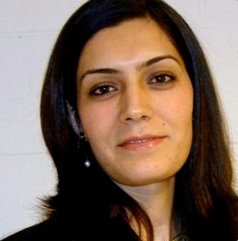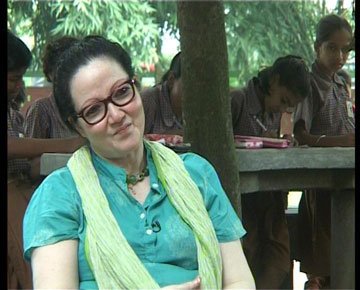2013
THE WOMEN HAVE WINGS AWARDS
Urmila Chaudhary
Nepal
Urmila Chaudhary was born in Manpur in the Terai Plains of southwestern Nepal. Her parents were Kamaiya, bonded laborers, as are many landless farmers from the ethnic group of the Tharu. Chaudhary and all of the women in her family—her mother, grandmother, aunt, and sisters — worked as slaves under the kamalari system.
After she was freed in 2007 with the help of international and local NGOs, Chaudhary was finally able to start school. She is currently attending high school in Lamahi/Dang in Nepal. As soon as she gained freedom, Chaudhary decided she had to fight for the many girls who still live in slavery under kamalari.
In December 2007, she was elected the first president of the Common Forum for Kamalari Freedom (CFKF), an organization founded by women and girls to fight for their rights. Chaudhary and a delegation of girls traveled several times to see the president, the prime minister, and other important government leaders in Nepal to seek financial support for the education of former slaves. Chaudhary organizes performances in villages to raise awareness among girls and their parents. She is a role model for the many freed girls, ranging from the ages of eight to twenty, who were unable to return to their families after being rescued from servitude. For more information, please watch this video: Oslo Freedom Forum 2012
Marusia Lopez Cruz and Daysi Yamileth Flores Hernandez work as a team.
Marusia Lopez Cruz
Mexico
Marusia Lopez Cruz is a Mexican feminist with eighteen years of experience in national and international human rights, development and pro-democracy organizations. She holds a Bachelor’s degree in ethnology from the National School of Anthropology and History (ENAH) and a Master’s degree in Gender and Development from the University of Barcelona.
Marusia is currently JASS Mesoamerica’s Regional Coordinator and is a member of the International Consultants Network for the Global Fund for Women. Within Mexico, she collaborates and assists with the Consortium for Parliamentary Dialogue and Equity. Marusia began her work with community organizations by promoting the rights and holistic development of campesina (peasant) women. She coordinated Elige, Young People’s Network for Sexual and Reproductive Rights from 2001 to 2005. She was a member of the Advisory Council for the Law to Encourage Activities Undertaken by Civil Society Organizations (Ley de Fomento a las Actividades Realizadas por Organizaciones de la Sociedad Civil), from 2006 to 2008. In 2005 she received the award from Semillas: “Women who Invest in Women”, and was co-recipient of the recognition “Struggling for our Future: A Tribute to Young Women who Struggle for Change”, awarded by MADRE.
Daysi Flores Hernandez
Honduras
Daysi Yamileth Flores Hernandez grew up in a barrio in Tegucigalpa, Honduras. She has been a feminist since she was 15 years old, co-founded the Red de Mujeres Jóvenes de Honduras (Young Women’s Network of Honduras) in 1998, and now identifies as an eco-feminist. A civil engineer, social media and communications expert, environmental activist, and a women’s and human rights activist, Daysi joined the JASS Mesoamerica regional team in November 2009.
Daysi is proud member of Feminists in Resistance against the 2009 military coup d’état in Honduras. She is part of Las Petateras and a leader in the National Network of Women Human Rights Defenders in Honduras. She is passionate about music, love, languages, children, yoga, cultural ancestry, clean energy, pets, and the environment.
For more information, please visit: www.justassociates.org
Andeisha Farid
Afghanistan
Andeisha Farid is the founder and Executive Director of Afghan Child Education and Caring Organization, (AFCECO). She was born in 1983 in Afghanistan, on the day when the former Soviet jets ruined her village in to rubbles and forced the entire community to leave their homeland and take refuge in Iran. Andeisha’s parents settled at a camp in Iran, where there was no school. Andeisha moved to Pakistan to stay at a hostel there and while studying in the refugee camp, she made the decision to tutor Afghan widows and children who had no place to learn.
In 2002, Farid moved to Islamabad to continue her education at the university level and there she began working with a local Afghan community, first as a teacher, and later as administrator and spokesperson of an Afghan school. Touched by the misery of Afghan street children in Islamabad who couldn’t attend school, Andeisha collected fund from the local community to establish a safe place where street children could come during the day.
After building a reputation she became known to CharityHelp International (CHI), a US non-governmental organization. With assistance from CHI Andeisha was able to open her first orphanage in Pakistan, and in short time to see her dream grow. While she was only 24 started a new non-profit, the Afghan Child Education and Care Organization (AFCECO). Today, AFCECO runs 11 orphanages in Afghanistan and refugee camps in Pakistan with 600 children of diverse ethnicities and has employed nearly 200 people who are mostly widows and university students.
Andeisha made a worldwide recognition in a short time. She was honored 2010 Global Leadership Award of Vital Voices and The Goldman Sachs & Fortune Global Women Leaders Mentoring Award at Fortune Most Powerful Women Summit 2010. Brian Williams of NBC Nightly News made many stories on Andeisha’s works which resulted her with hundreds of sponsors and supporters in the US. Andeisha was also invited to attend a summit on entrepreneurship hosted by Barack Obama, where the President found her story compelling enough to mention in his speech to the entire community: “Andeisha Farid, an extraordinary woman from Afghanistan, who’s taken great risks to educate the next generation, one girl at a time. Together, they point the way to a future where progress is shared and prosperity is sustainable.
In the face of extraordinary adversity and the challenging climate she faces in Afghanistan today, Andeisha acts as an integral part of her country’s efforts to rebuild, educating the next generation of leaders who will lead their nation forward. In addition to providing children a safe and nurturing environment, Andeisha’s AFCECO instills important leadership values of tolerance and an appreciation for education in Afghanistan’s future generations. In this way, Andeisha believes that AFCECO’s principles and policies better position their children for future success, and on an even greater scale, enabling them to shape to a more tolerant and prosperous future for Afghanistan.
For more information, please visit: www.afceco.org
Olutosin Oladosu Adebowale
Nigeria
A fierce Nigerian social entrepreneur, women’s rights activist, community leader, and poet, Olutosin Oladosu Adebowale is a passionate global advocate to empower rural women and girls and end sexual violence of all forms.
She has founded an on-the-ground organization called Star of Hope Transformation Center which empowers local communities to end child sexual abuse and heal survivors. She has also launched income generating projects for more than 200 women. She also initiated a mentorship programme for girls living on the riverside in Lagos.
Olutosin is an author, citizen journalist and poet who speak out frequently on the topics of widowhood, corruption, poverty, and transformational leadership. An accomplished leader, she holds positions such as: Secretary and gender expert of Lagos State Gender Advocacy team, a network of NGO’s in Lagos, Nigeria; World Pulse correspondent; an International Consultant on Gender and Women Issues; and was selected as one of the 15 Global Change Leaders (2013) by St Francis Xavier University, Nova Scotia, Canada. Olutosin studied Transformation.
Shabnam Ramaswamy
India
From eking out a living on Kolkata’s streets to working as an interior decorator, Shabnam Ramaswamy’s life has been full of twists and turns. Born in a village in the interiors of West Bengal’s Murshidabad, Shabnam, got to study in Kolkata’s elite La Martinere School, thanks to her father’s Army job. At 16, she was married off to a wealthy 32-year-old who would beat her to a pulp. After bearing him two kids, her husband would regularly throw her out of the house at night because he felt their son didn’t look like him. One night, at 24, she left home with her son.
For two months, she lived in a shanty at Sealdah station after which she got herself a job and worked her way out of poverty. Within a decade, she succeeded in her job as an interior decorator, got a divorce and won custody of her children. But she began to tire of high-society life and trained her sights on social work. “I decided to leave Kolkata, as it was awkward going from businesswoman to social worker in the very same city,” she said. She wrote down the names of six cities on chits of paper and asked her daughter to pick a chit. The girl picked Delhi, so that’s where the family went.
Shabnam joined Mira Nair’s Salaam Balak, where she befriended runaways at Delhi station. A senior journalist, Jugnu Ramaswamy, approached her with the intention of making a film on her work. He not only made the film, but married her too. The Ramaswamys set up a school for street kids in Delhi, called Jagriti. After the school was demolished by the Delhi government, they headed to Katna in West Bengal, where they decided to set up a state-of-the-art school with the same name for rural kids. In 2005, just before the school began, Jugnu died of a heart attack, leaving Shabnam to run it single-handedly. Today, the school boasts several school rooms, workshops, and hostels for 500 students, teachers and staff.
For more information, please visit: streetsurvivorsindia.in
Sylvia Estrada-Claudio
Philippines
Dr. Sylvia Estrada-Claudio is a doctor of medicine who also holds a PhD in Psychology. She is Director of the University of the Philippines Center for Women’s Studies and Professor of the Department of Women and Development Studies, College of Social Work and Community Development, University of the Philippines. She teaches Feminist Theories and Movements, Feminist Research Methods and Gender Culture and Ideology. She led the UPCWS project, WOWWVote (Watch Out When Women Vote) which aimed to strengthen capacities and linkages of civil society groups and academe-based institutions to promote gender-sensitive and rights based perspectives through citizens’ electoral participation. Recent researches include: Gender and Justice Action Research, Asia-wide research project on Gender, Citizenship and Information Society, and One UP Health Benefits Action Research. She was appointed Chair of the President’s Committee to study and recommend the guidelines to implement the Magna Carta of Women in the University of the Philippines. She is author of the book, “Rape Love and Sexuality: The Construction of Woman in Discourse” (UP Press, 2002) and part of the Editorial Board of Law and Society Journal, University of the Philippines College of Law. Dr. Claudio was also co-founder, and now Chair of the Board of Directors of Likhaan, an organization working with grassroots women on issues of reproductive and sexual health and rights. She was also the Chair of the Board of the Women’s Global Network for Reproductive Rights with offices in Manila and Amsterdam.
For more information, please visit: UP Center for Women’s and Gender Studies







